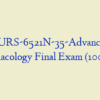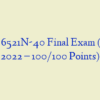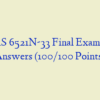Description
NURS 6521 Final Exam- Advanced Pharmacology Summer 2022 – WEEK 11
- When planning care for a patient who is receiving filgrastim (Neupogen) for a nonmyeloid malignancy, the nurse should formulate which of the following patient outcomes? (Select all that apply.)
- A 7-year-old child has been taking tetracycline for a bacterial infection. The nurse will be sure to inform the parents that this drug could cause
- A 51-year-old female patient has been receiving doxorubicin (Adriamycin) for metastatic breast cancer. Her medical record indicates she has cardiomyopathy and a cumulative dose of 300 mg/m2 of doxorubicin. Which of the following measures would help limit the severity of cardiomyopathy in this patient?
- A 5-year-old boy needs an IM injection. The least painful and most effective injection site would be the
- A male patient is taking finasteride for BPH. Which of the following will the nurse evaluate at each clinic visit?
- A Nurse Practitioner is caring for a 64-year-old female patient who is receiving IV heparin and reports bleeding from her gums. The nurse checks the patient’s laboratory test results and finds that she has a very high aPTT. The nurse anticipates that which of the following drugs may be ordered?
- Sulconazole has been prescribed for a patient with tinea pedis. The nurse will instruct the patient to use the topical agent
- A 5-year-old boy needs an IM injection. The least painful and most effective injection site would be the
- A Nurse Practitioner is aware that the concept of selective toxicity is foundational to antimicrobial therapy. Which of the following statements most accurately describes selective toxicity?
- A pregnant patient who has diabetes has been admitted to the hospital to begin labor. Since the patient has diabetes, the physician has decided to use oxytocin (Pitocin) to initiate labor contractions. When talking to the patient about the adverse effects of the drug, the nurse should understand that the most common adverse effects of the drug include
- A 45-year-old female patient is prescribed ciprofloxacin to treat a bronchial infection. A nursing assessment revealed that she started taking daily vitamin supplements about 2 years ago. To maximize the therapeutic effects of the ciprofloxacin therapy, the nurse should advise the patient to
- A man is prescribed ciprofloxacin to treat a sexually transmitted infection. The nurse will instruct the patient to
- The recommended treatment for trichomoniasis is Selected Answer: Flagyl.
- A Nurse Practitioner working in a cancer center is preparing to administer medication to a 5-year-old child. The nurse will calculate the drug dosage by using
- A patient is receiving radiotherapy for an overactive thyroid gland and asks whether her milk is safe for her baby. If her treatment cannot be discontinued, what should the nurse recommend?
- On the advice of her sister, a 52-year-old woman has visited her nurse practitioner to discuss the potential benefits of hormone replacement therapy in controlling the symptoms of menopause. Which of the following responses by the nurse is most appropriate?
- A postmenopausal patient is prescribed bisphosphonates to treat osteoporosis. The nurse will instruct the patient to take the drug
- The Nurse Practitioner notices a cold sore on a patient’s upper lip and requests medication; docosanol (Abreva) is ordered. Before applying the medication, the nurse would first
- A nurse practitioner orders a single dose of 2 g Metronidazole orally. How many milligrams will the patient receive in one dose?
- A 16-year-old boy is prescribed cromolyn sodium nasal spray to treat a nasal allergy. To maximize the therapeutic effects of the drug, which of the following will the nurse include in instructions to the patient?
- A patient with non-Hodgkin’s lymphoma (NHL) will be starting a course of doxorubicin shortly. When planning this patient’s care, what nursing diagnosis should the nurse prioritize?
- An oncology nurse is reviewing the pathophysiology of cancer and is discussing with a colleague the factors that contribute to the success or failure of a patient’s chemotherapy. Which of the following cancerous cells is most susceptible to the effects of chemotherapeutic drugs?
- A female patient is taking oral cyclophosphamide therapy for breast cancer. Because of possible adverse effects of the drug, the nurse will instruct the patient to do which of the following?
- A Nurse Practitioner who provides care on a pediatric medicine unit has conducted a medication reconciliation of a recently-admitted patient. In light of the fact that the child takes methylphenidate (Ritalin), the nurse is justified in considering a history of what health problem?
- A 60-year-old patient experienced a sudden onset of chest pain and shortness of breath and was subsequently diagnosed with a pulmonary embolism in the emergency department. The patient has been started on an intravenous heparin infusion. How does this drug achieve therapeutic effect?
- A Nurse Practitioner is caring for a 10-year-old boy who complains of chronic headaches. His mother reports that she gives him Tylenol at least three times a day. Which of the following will the nurse work with the physician to evaluate?
- A Nurse Practitioner is going to administer medication to an infant using a medicine dropper. The best method is to open the child’s mouth by gently squeezing the cheeks and placing the drops
- Intravenous carmustine has been prescribed for a patient with cancer. The nurse should help relieve the discomfort of pain and burning during the infusion by
- A 54-year-old woman with a history of osteoporosis has been prescribed ciprofloxacin for recurrent cystitis. Because of the patient’s history, the nurse would be sure to discuss with the woman the use of
- A 20-year-old woman will soon begin taking oral contraceptives for the first time. What advice should the nurse provide to this patient?
- A patient has been admitted to the critical care unit with a diagnosis of peritonitis that has necessitated treatment with gentamicin. As a result, the care team should be cautious when concurrently administering other medications that may cause
- A 62-year-old patient taking tamoxifen exhibits increased bone and tumor pain along with a local disease flare. The nurse interprets this as an indication of which of the following?
- A 15-year-old patient has meningitis caused by Haemophilus influenzae. She is being treated with chloramphenicol. The most important nursing action for this patient would be to monitor
- A Nurse Practitioner is explaining to the parents of a 6-year-old child suffering from angina why nitroglycerin patches for chest pain would not be appropriate. Which of the following will the nurse include in an explanation?
- A 13-year-old female took a weight loss drug that activated the sympathetic nervous system. Which of the following assessment findings would the nurse expect?
- A 71-year-old man has just been prescribed finasteride (Proscar). Which of the following complaints by this patient most likely indicated a need for this drug?
- A 59-year-old man with a recent history of erectile dysfunction has been assessed and prescribed sildenafil (Viagra). When providing patient education to this man, the nurse should tell him which of the following?
- Morphine has been prescribed for a 28-year-old man with severe pain due to a back injury. The nurse will advise the patient to avoid
- A nurse practitioner has administered filgrastim to a diverse group of patients in recent months. Which of the following patients should the nurse observe for extremely elevated white blood cell counts following administration of the drug?
- A 9-year-old boy was bought to his primary care provider by his mother with signs and symptoms of hookworm infection and will be sent home with a prescription for mebendazole. When provided patient and family education, the nurse should teach the mother with which of the following measures to avoid reinfection following treatment?
- A 66-year-old woman has experienced a significant decline in her quality of life as a result of worsening rheumatoid arthritis. Her physician has prescribed etanercept and the APRN is responsible for facilitating this new aspect of the patient’s drug regimen. This will involve the administration of
- A Nurse Practitioner educator who coordinates the staff education on an oncology unit is conducting an in-service on targeted therapies. What potential benefit of targeted therapies should the nurse highlight in this education session?
- An elderly woman is slated for a hemiarthroplasty (hip replacement surgery) after falling and breaking her hip on the stairs outside her home. The woman’s pain in the time since her injury has been severe, and her care team has been treating it with morphine. Which of the following administration schedules is most likely to control the patient’s pain?
- A male patient has been brought to the emergency department during an episode of status epilepticus. Diazepam is to be administered intravenously. The APRN will be sure to
- A 73-year-old woman has osteoporosis and is prescribed alendronate. She takes calcium and vitamin D supplements, drinks lots of water, and has just quit smoking. The nurse should advise the patient to also
- A 65-year-old woman has an advanced form of rheumatoid arthritis. Her treatment includes a regular dosage of methotrexate. The APRN will advise her to take which of the following vitamin supplements while taking the drug?
- A male patient has been on long-term bicalutamide (Casodex) therapy. In order to assess the adverse effects of the drug therapy, the nurse will closely monitor which of the following?
- A nurse practitioner has been assigned to a 55-year-old woman who has a malignant brain tumor. The patient is receiving her first dose of carmustine. It will be critical for the nurse to observe for which of the following?
- A Nurse Practitioner is explaining the use of acyclovir therapy to a 72-year-old man. Nephrotoxicity is discussed as a major adverse effect in older patients. To minimize the risk of the patient developing this adverse effect, the nurse will advise him to
- A pregnant patient asks the Nurse Practitioner what over-the-counter medication she can take for recurring headaches. The nurse should recommend
- A 51-year-old female patient has been receiving doxorubicin (Adriamycin) for metastatic breast cancer. Her medical record indicates she has cardiomyopathy and a cumulative dose of 300 mg/m2 of doxorubicin. Which of the following measures would help limit the severity of cardiomyopathy in this patient?
- A Nurse Practitioner is assigned to a patient who is at 32 weeks’ gestation and is receiving terbutaline (Brethine) IV for 24 hours to control preterm labor. Which of the following nursing actions will the nurse take to decrease the risk of hypotension and promote circulation to the fetus?
- A male patient is trying to decide if he should use finasteride (Proscar) to treat benign prostatic hypertrophy (BPH). When providing information about the drug, the nurse will include which of the following as a risk associated with finasteride therapy?
- A 43-year-old man has been diagnosed with active TB. He has prescribed a multiple drug therapy, including INH and rifampin. A priority assessment by the nurse will be to monitor which combination of laboratory test results?
- A patient with AIDS has developed a number of secondary infections in recent weeks, including Kaposi’s sarcoma. As a result of this most recent diagnosis, his care team has opted to begin treatment with interferon alfa-2a. The nurse is aware that this drug will address the etiology of Kaposi sarcoma by
- A 46-year-old man is receiving a quinupristin/dalfopristin IV infusion for a life- threatening infection. Which of the following would be most important for the nurse to monitor?
- Mr. Singh is a 66-year-old man who is receiving chemotherapy for the treatment of lung cancer that has metastasized to his liver. In an effort to prevent infection, Mr. Singh has been prescribed filgrastim (Neupogen). Which of the nurse’s following assessment questions most directly addresses a common adverse effect of filgrastim?
- A patient has acquired primary hypogonadism and has been prescribed testosterone transdermal (Androderm) patches. When educating the patient on how to administer the drug, the nurse will instruct him to
- A Nurse Practitioner is assessing a patient who has chronic lymphoblastic myelogenous leukemia. The treatment plan includes hydroxyurea (Hydrea). The nurse will assess the patient for which of the following?
- A 12-year-old boy is being discharged from the hospital after major surgery. The boy will be taking two medications at home for an extended period. The nurse who is discharging the patient should provide medication teaching specifically to
- A Nurse Practitioner is caring for a 46-year-old female patient who is taking paclitaxel for ovarian cancer. Two or three days after the infusion of the drug, the nurse must closely monitor for which of the following?
- A patient reports to a clinic with complaints of breast tenderness, a right lumpy breast, and no breast discharge. The breast tenderness occurs primarily during her menstrual cycle. The nurse practitioner probably suspects
- A Nurse Practitioner is caring for a patient with cancer who has been prescribed dronabinol (Marinol) to help reduce nausea and vomiting from chemotherapy. The nurse will inform the patient that he or she is taking an oral form of
- A 36-year-old woman with a history of dysmenorrhea has begun treatment with progesterone, which she will be receiving by the intramuscular route. The nurse participating in the woman’s care should prioritize which of the following potential nursing diagnoses?
- A Nurse Practitioner is discussing with a 58-year-old male patient the causes of erectile dysfunction in men over 50 years of age. Which of the following will the nurse inform the patient is the primary physical cause of erectile dysfunction of men in this age group?
- A 33-year-old man has developed acute gouty arthritis. He has been prescribed colchicine. When developing a care plan for this patient, which factor will be most important for the nurse to consider?
- A patient is being seen in the emergency department for a sprained ankle and is given a drug to relieve pain. When a second dose of the pain medication is given, the patient develops redness of the skin, itching, and swelling at the site of injection of the drug.
- A Nurse Practitioner is performing patient education for a woman who has just been prescribed a bisphosphonate. Which of the following diagnostic and history findings would have prompted the woman’s care provider to prescribe a bisphosphonate?
- Drugs have a valid medical use but a high potential for abuse, both psychological and physiologic. In an emergency, a Schedule 2 drug may be prescribed by telephone if a written prescription cannot be provided at the time. However, a written prescription must be provided within 72 hours with the words authorization for emergency dispensing written on the prescription. These prescriptions cannot be refilled. A new prescription must be written each time. Examples include certain amphetamines and barbiturates. This is scheduled drug
- A 66-year-old man has made an appointment with his primary care provider to discuss his recent erectile dysfunction (ED) and has requested a prescription for tadalafil (Cialis) based on television commercials he has seen. What characteristic of this patient would most likely contraindicate the use of tadalafil for his ED?
- A Nurse Practitioner is working with a 16-year-old pregnant teen and assessing for behavior that may put the baby at risk. The most important assessment the nurse can
- A 34-year-old male has been diagnosed with TB and will be started on INH therapy. The medication history reveals that he currently takes antacids on a regular basis. The nurse will instruct the patient to take
- A 30-year-old woman who is in the first trimester of pregnancy has presented to her primary care provider with a 4-day history of a reddened, itchy left eye that is crusted with purulent exudate. The clinician suspects a bacterial, rather than viral, etiology. How will the patient’s pregnancy affect the potential use of ciprofloxacin to treat her conjunctivitis?
- A woman is receiving magnesium sulfate for intrapartum eclampsia. The patient is perspiring and her blood pressure is 88/50. The serum magnesium level is 10 mg/dL. The nurse will interpret these manifestations as
- A 6-month-old child has developed skin irritation due to an allergic reaction. He has been prescribed a topical skin ointment. The nurse will consider which of the following before administering the drug?
- Which of the following would a Nurse Practitioner assess for in a patient who is taking polymyxin B systemically?
- A 19-year-old patient reports to a clinic with vaginal discharge with a foul odor. A microscopic exam reveals trichomonas vaginalis. The nurse practitioner is aware that
- Which of the following would the nurse include in a teaching plan about the signs and symptoms of thrombophlebitis and thromboembolism that should be reported by a patient taking estrogen?
- A patient has been admitted to the critical care unit of the hospital with bacterial septicemia that has failed to respond to initial antibiotic treatment. The patient’s most recent blood cultures reveal the presence of methicillin-resistant Staphylococcus aureus (MRSA) in the patient’s blood. The nurse will anticipate that this patient will likely require intravenous administration of what antibiotic?
- A 72-year-old patient is prescribed ophthalmic ciprofloxacin for a bacterial infection in her right eye. The nurse will teach her to observe for which of the following adverse effects of the drug?
- A patient is prescribed ganciclovir to treat a CMV infection. An oral dosage is prescribed. To help increase bioavailability of the drug, the nurse will encourage the patient to take the medication
- During ongoing assessment of a patient receiving 5-FU therapy, the nurse finds the patient’s platelet count to be 92,000 cells/mm3. The nurse should do which of the following?
- A Nurse Practitioner is to use a single-dose 1 mL vial to administer 0.5 mL of epoetin alfa to a 39-year-old woman who is being treated for chemotherapy-induced anemia. Which of the following will the nurse do with the unused portion of the drug?
- The recommended treatment for trichomoniasis is
- A Nurse Practitioner is providing patient education to a 50-year-old woman who is taking methotrexate (MTX) for breast cancer. The nurse will instruct the patient to avoid which of the following drugs?
- A Nurse Practitioner is obtaining baseline physical data from a 7-year-old patient who is to be started on dextroamphetamine for ADHD. After obtaining vital signs, height, and weight, the nurse will prepare the patient for an
- A 45-year-old woman with acute leukemia is going to begin chemotherapy with vincristine. The nurse is aware that vincristine must always be administered
- A Nurse Practitioner will monitor which of the following when assigned to a patient taking allopurinol for chronic gout who visits the clinic every 2 months.
- An immunocompromised 7-year-old child was recently discharged home with a peripherally inserted central line (PIC line) for home antibiotic therapy. He has now been brought to the emergency department by his mother and father with signs and symptoms of line sepsis. Upon questioning, the mother states that she has been removing the PIC dressing daily and washing the site with warm water and a cloth. What nursing diagnosis is most appropriate in this situation?
- A Nurse Practitioner educator who coordinates the staff education on an oncology unit is conducting an in-service on targeted therapies. What potential benefit of targeted therapies should the nurse highlight in this education session?
- Mr. Laird is a 49-year-old electrician who experienced severe burns on his trunk, arms, and hands in a workplace accident 2 weeks ago. Part of his current wound care regimen involves the daily application of silver sulfadiazine to his wounds. The nurses who are providing care for Mr. Laird in the burns and plastics unit of the hospital should perform what action when administering this medication?
- A Nurse Practitioner is performing patient education for a woman who has just been prescribed a bisphosphonate. Which of the following diagnostic and history findings would have prompted the woman’s care provider to prescribe a bisphosphonate?
- A Nurse Practitioner who provides care on a pediatric unit of a hospital is aware that the potential for harm as a result of drug errors is higher among infants and children than adults. This fact is primarily due to
- A 36-year-old patient comes to the clinic and tells the nurse practitioner that she suspects that she is pregnant. During the initial assessment, the nurse practitioner learns that the patient is currently taking medications for diabetes, hypertension, and a seizure disorder. The nurse would be most concerned about which of the following medications?
- A patient has been prescribed oral tetracycline. The nurse will instruct the patient to take the drug
- A 39-year-old woman is receiving doxorubicin for the treatment of cancer. After each treatment, the patient has acute nausea and vomiting accompanied by a slightly increased heart rate. The nurse will advise her to
- Mr. Lepp is a 63-year-old man who was diagnosed with colon cancer several weeks ago and who is scheduled to begin chemotherapy. He reports to the nurse that he read about the need for erythropoietin in an online forum for cancer patients and wants to explore the use of epoetin alfa with his oncologist. Which of the following facts should underlie the nurse’s response to Mr. Lepp?
- A 16-year-old boy is prescribed cromolyn sodium nasal spray to treat a nasal allergy. To maximize the therapeutic effects of the drug, which of the following will the nurse include in instructions to the patient?
- An elderly woman is slated for a hemiarthroplasty (hip replacement surgery) after falling and breaking her hip on the stairs outside her home. The woman’s pain in the time since her injury has been severe, and her care team has been treating it with morphine. Which of the following administration schedules is most likely to control the patient’s pain?
- A 7-year-old child has tonsillitis and is prescribed penicillin V, which is to be administered at home. The nurse will instruct the parents to administer the drug








